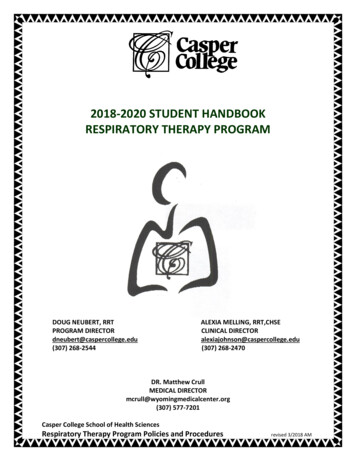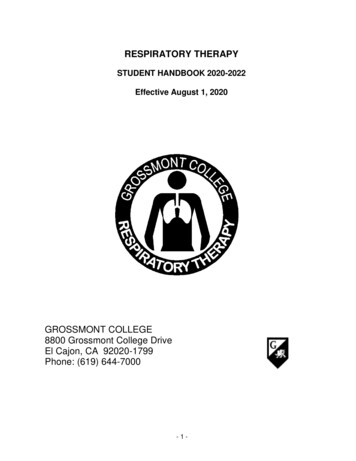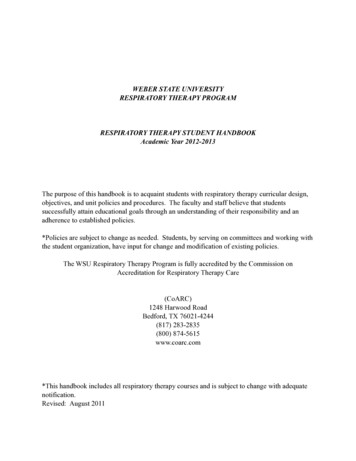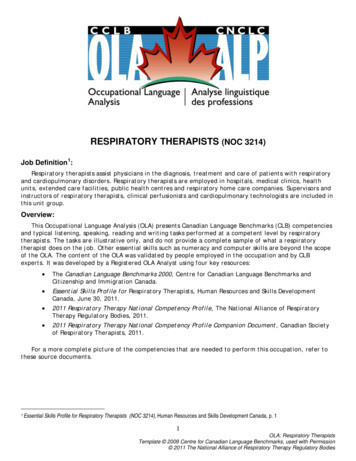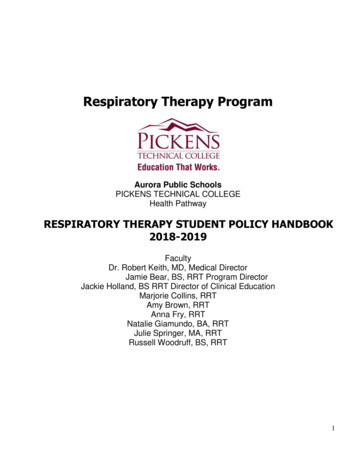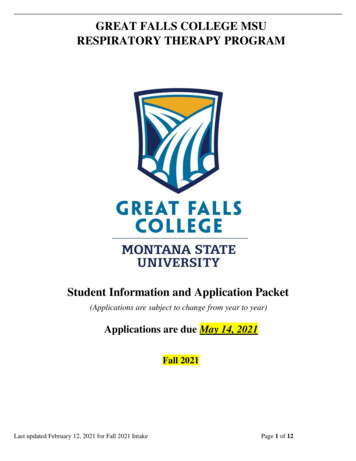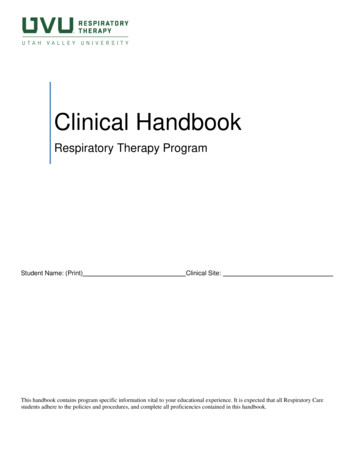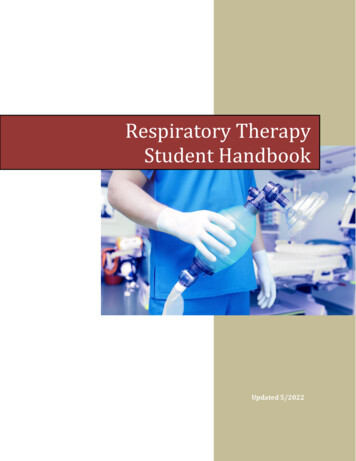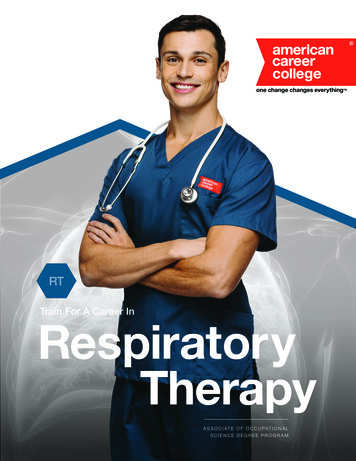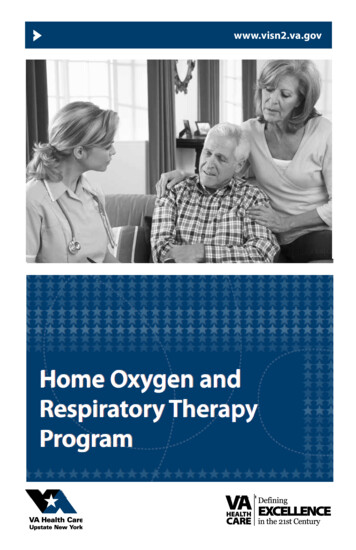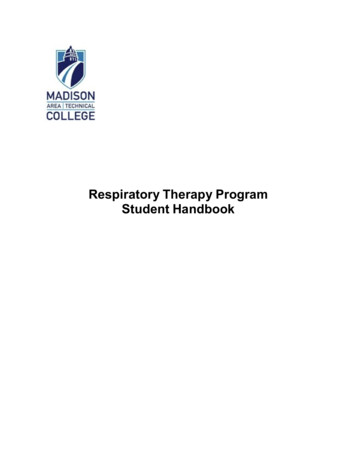
Transcription
Respiratory Therapy ProgramStudent Handbook
Table of Contents:TopicPage #Faculty WelcomeMadison College MissionMadison College VisionMadison College ValuesUnderstanding of Program PoliciesAccreditationProgram DescriptionProgram GoalProgram VisionProgram PhilosophyDescription of CareerCredentialing of Respiratory TherapistsCurriculumTransfer of CreditsWithdrawal and Re-EntryAuditing CoursesCastle BranchBackground CheckTuberculosis policyVaccination policyInfluenza Vaccine PolicyCPRHealth InsuranceDrug ScreeningFaculty AdvisingProgram FacultyProgram PoliciesEvaluation / Grading PolicyLate Work policyClassroom Attendance PolicyReasonable Accommodations PolicyStudent Code of ConductDismissal From ProgramConcerns and ComplaintsUse of Electronic devices in the classroomHIPAARespiratory Therapy Program Code of Ethics Regarding Social 131314141415
FERPAStudy Area AvailabilityOffice Hours and Open LabSelf-Assessment ExaminationsRelease of Academic InformationStudent EmploymentEssential Functions of The Respiratory Therapy ProgramPregnancy PolicyAdvisory BoardClinical Description and PoliciesClinical AffiliatesNorth Regional Respiratory Care ConferenceClinical Dress CodePersonal HygieneClinical AttendanceUse of Electronic Devices in Clinical SettingEthical PracticeClinical Grading PolicyClinical SchedulingPolicy for Poor Clinical PerformanceAARC statement of Ethics and Professional ConductGraduation RequirementsStudent Handbook Verification 8
WelcomeThe Faculty welcomes you to the Madison College Respiratory Therapist Program.During your experience here, you will apply information from the classroom into thelaboratory and clinical setting. You will develop and draw on many skills, from criticalthinking to empathy. In the clinical setting every patient, every situation is unique. You can’tmemorize all the answers, but you will be expected to apply the Respiratory Care skillsthat you have learned.Your professional behavior is also essential. Those qualities—over and beyond theknowledge you gain and the skills you learn—which are essential for your success inschool and in your later work as a Respiratory Therapist. In broad terms, you will beexpected to demonstrate respect for others, communicate effectively, cooperate with fellowworkers, and display the dependability expected of a professional. Give 100% and treatyour classmates, instructors, patients, and co-workers, as you would like to be treated.Those who make the most of the program learn early on that the program faculty, clinicalstaff and instructors, and other college personnel work extremely hard to build a bridge foryou to successfully graduate and realize your dream. You can become a RespiratoryTherapist and enjoy a rewarding and successful career. It is up to you to be successful; weare here to help you achieve your goals.In our experience, we have come to know our success is dependent upon your successboth in the program and in clinical practice after you graduate; therefore we look forward toassisting you in your efforts to become a knowledgeable and skilled Respiratory Therapist.Sincerely,The Madison College Respiratory Therapy Faculty4
Madison College Mission, Vision and ValuesMissionMadison College provides open access to quality higher education that fosters lifelonglearning and success within our communities.VisionTo be the leader in accessible affordable education that meets the evolving needs of ourdiverse communities.Values ExcellenceRespectCommitment to students and diverse communitiesMaking higher education available to allMadison College is committed to diversity and does not discriminate. We strive to grow andsustain a culture where all people are valued for who they are and who they will become.The nature of diversity includes but is not limited to gender, race, sexual orientation,ethnicity, disability, age and religion. Each person is treated with respect, and all studentsare given the tools to find success.Understanding of program policies and proceduresIn order to ensure effective education in the Respiratory Therapist Program, each individualparticipating in the program must have a full understanding of the responsibility involved.The Respiratory Therapy Student Handbook is designed to provide the student with thenecessary information regarding policies, procedures, and expectations in the RespiratoryTherapist Program. This handbook is meant to be a guide to assist the student in attainingtheir goal to become a competent Respiratory Therapist. Revision of the handbook is anongoing process and every effort will be made to keep students advised of any changes tothe handbook, as well as to minimize the inconvenience such changes might create. Thehandbook will be posted on the program’s webpage. Students are expected to read thehandbook thoroughly. Students will be required to sign an acknowledgement form indicatinghis/her understanding of the program handbook. Any questions regarding the handbookshould be directed to the program faculty.AccreditationThe most important goal of the Madison College Respiratory Therapist program is thegraduation of competent Respiratory Care Practitioners to include knowledge, technicalskills and professional behaviors. Using National Board for Respiratory Care (NBRC) examresults as well as student, graduate, employer and faculty surveys the program strives tocontinually improve. To document and assist in maintaining high quality education, theCommission on Accreditation for Respiratory Care (CoARC) accredits the program. If youhave questions/concerns regarding the program’s accreditation status, you can contactCoARC at:817-283-28355
http://www.coarc.com/Information related to the program’s success on NBRC exams, job placement as well asother outcomes can be found at the following link: http://www.coarc.com/47.htmlYou can scroll to the last page and look for Madison Area Technical College to facilitateyour search for the program.Program DescriptionThe Respiratory Care Program prepares the graduate to take an active role in themaintenance and/or restoration of cardiopulmonary homeostasis. The curriculum includesintensive course work in the supporting sciences and general education areas. Classroominstruction is supplemented with learning experiences in the campus laboratory and in areaclinical affiliates. Students enrolled in the Respiratory Care Program are required to achievea minimum grade of "C" in each Respiratory Care course and each required science course.The program is a 21-month program that results in graduates receiving an Associate ofApplied Science (AAS) degree in Respiratory Therapy upon successful completion of thecurriculum.Program GoalThis program is designed to prepare graduates with demonstrated competence in thecognitive (knowledge), psychomotor (skills), and affective (behavior) learning domains ofrespiratory care practice as performed by registered respiratory therapists (RRTs)Program outcomes1. Apply Respiratory Therapy concepts to patient care situations2. Demonstrate technical proficiency required to fulfill the role of a Respiratory Therapist3. Practice Respiratory Therapy according to established professional and ethicalstandardsProgram VisionIt is the desire of the program faculty to continue to develop a Respiratory Care Programwhose graduates and faculty enjoy a reputation of excellence.Program PhilosophyThe Faculty of the Respiratory Care Program believes that: The purpose of the program is to serve students who wish to become RespiratoryTherapists; and that by so doing, the program serves the future patients of thesestudents;Knowledge, skills, behavior and attitude are of equal importance in the developmentof respiratory care practitioners;The graduates of the program should possess competence at the level of theadvanced practitioner, with adequate knowledge in the scientific foundation; criticalthinking skills; and strong ethical principles;The program faculty hold sacred the dignity and worth of all people regardless ofrace, creed, sex, disadvantage, handicap, or social status6
Description of the careerRespiratory Therapists are members of a team of health care professionals and work in awide variety of clinical settings. They evaluate, treat and manage patients of all ages withrespiratory and cardiopulmonary disease. In addition to performing therapies, RespiratoryTherapists are involved in clinical decision- making and patient education. RespiratoryTherapists work primarily in hospitals providing and assessing the clinical status of patientsand performing diagnostic testing. They may also work in diagnostic labs, such aspulmonary function and sleep labs. Home care is another area where the respiratorytherapist is employed. Therapists work in emergency rooms, intensive care units,participating in life support procedures including airway care, mechanical ventilation andresuscitation. In addition to other therapies, they provide the delivery of medication topatients’ airways, including patients with asthma, emphysema, chronic bronchitis and cysticfibrosis.Credentialing of Respiratory TherapistsUpon completion of this fully accredited advanced –level respiratory therapist program,graduates are required by the State of Wisconsin to become a licensed practitioner.The credentialing exam, the therapist multiple-choice exam, is administered by the NationalBoard for Respiratory Care. Graduates are eligible to take the exam immediately aftergraduation. Employers will require that you have this credential as a condition ofemployment. Successful completion of this exam will grant you the credential of CRT,Certified Respiratory Therapist. As a graduate of an advanced practitioner level program,you are also eligible to take the clinical simulation exam. Successful completion of this examwill award you the credential of RRT, Registered Respiratory Therapist. This is the highestlevel of credentialing that you can achieve and is often a requirement for employment. We,along with hospital employers, highly encourage you to take these exams.In addition, the state of Wisconsin requires that you apply for and obtain a State ofWisconsin license to practice Respiratory Care. This can be done upon graduation and yourinstructors will assist you.CurriculumGeneral Chemistry must be taken within 5 years of petitioning for the program or during thepetitioning semester. The curriculum sheet for the Respiratory Therapist program as well ascourse descriptions can be found at this y-therapistRequired Respiratory Therapy courses are designated with a 515 number as the middlethree digits. Each of these courses are offered only once a year and are prerequisites forsubsequent 515 courses so they must be taken in sequence. Required science coursesmust be taken in or before the semester they are listed on the curriculum sheet. Many ofthese are prerequisites for 515 courses so failure to complete them in time may precludeyou from continuing in the program. The following science courses must be completedwithin 5 years of petitioning for the program or can be taken during the program curriculum;General A&P and Microbiology. See the program course information for prerequisite andcorequisitesContinuous enrollment (semesters) in the program and a grade of “C” or better in all 515courses and all required science courses are necessary for successful completion of the7
Respiratory Therapist Program. A student who withdraws from or earns lower than a gradeof “C” in a Respiratory Therapy (515) course or a required science course will be droppedfrom the Respiratory Therapy Program with the possibility for re-entry into the program thefollowing year. (See re-entry for more information)Transfer of creditsTransfer of course work/credits completed at other colleges or universities will be evaluatedwhen official transcripts are received at the college. All courses completed at otherinstitutions are considered for transfer credit only if they were taken at fully accreditedinstitutions and are equivalent in content and credit value. The transfer credit departmentwill review your transcripts. In addition, your assigned faculty advisor will review your coursework and determine if there are courses that should be considered for advanced standing.Please consult with your assigned advisor if you have questions regarding your courses.Advanced standing for respiratory therapy and science courses must have been completedwithin 5 years of admission to the respiratory therapy program. Exceptions to this will bemade by joint consensus of the program faculty and the School of Health Education Dean.Withdrawal and re-entryA student who fails a respiratory therapy course or withdraws from the Respiratory Therapyprogram may request to reenter the program by contacting the Program Director andcompleting the following steps. A student may only reenter the program once.Note: (It is the responsibility of the student to withdraw from a Respiratory Therapy course.The student must initiate the withdrawal process according to the procedures listed tep 1: Meet with the Program Director to discuss student status and reenrollment-reentryoptions (extension agreement). Failure to discuss withdrawal with the Program Director mayjeopardize the student’s ability to reenroll/reenter. The student is responsible for followingthe Madison College Procedure for course/program withdrawal.Step 2: A written request to the Program Director is required for reenrollment- reentryconsideration. All requests are considered on a space available basis.Step 3: If approved the student will sign an extension agreement allowing the student to reenter the program the following year based on space limitations.Step 4: The student must work with faculty and create an action plan for future success inthe program. This plan lays out the steps the student will take to overcome the barriers thatare preventing success. For example, a student may be asked to work in an entry-levelhealthcare position while waiting for re-entry to the program or take an entry-level mathcourse to improve their math skills.Step 5: Students will be required to complete competency testing to determine courseplacement; remedial work may be required along with auditing courses. Individualizedremediation will be determined by the Program Director and faculty recommendations. Thestudent’s entire file will be reviewed for purposes of evaluation for placement in theprogram. A student re-entering the program will continue in the course sequence but will berequired to audit courses necessary to regain competency, keeping in mind fees for auditingcourses will apply. A student that withdraws from the program and does not complete an extensionagreement will not be able to reenter the program and must reapply to the program8
submitting the required application. You will be given credit for the science courses andgeneral electives that you successfully completed provided they fall within the 5-yearwindow of your last withdrawal.You should be assured that if you find the course work too challenging that you can makethe program 3 years in length. If you need to extend the program, please realize that it is notfailure and many times students have more time to learn by extending the program. Wehave many successful graduates who completed the program over 3 years. However, youMUST follow Steps, 1, 2, 3, 4 and 5 listed above in the Withdrawal/Reenter section.Auditing coursesTo audit a class, you must meet the following requirements: The class MUST be a degree credit class. Non-credit, non-degree and enrichmentclasses cannot be audited. A seat must be available. You must meet all enrollment requirements. You must declare your intent to audit at the time of registration, which must be priorto the class start date. Staff assistance is required to enroll as an audit. You may call the Enrollment Centeror visit in person. Tuition and fees are not modified except for students 60 years old or older, who areeligible for a Fee Exemption. You must meet attendance requirements, participate in the classroom work andcomplete assignments, but may not participate in examinations/evaluations. Audited classes have a final grade of "AU," which is not calculated in your GPA.Audited classes do not: Fulfill admission or enrollment requirements. Count towards a student's enrollment status. Count towards program certification or graduation requirements. Count for financial aid or veteran’s educational benefit calculations. Factor into satisfactory academic progress for financial aid purposes.Castle BranchOnce admitted to the Respiratory Therapy Program all students must purchase an accountfrom Castle Branch. This is where your criminal background check, immunization record,drug screening and related documents will be housed during the program. Cost of theaccount is a onetime fee. The account must be purchased before the programs orientationday in August. You will be informed of the date once you are admitted to the program.To purchase your account click on the following link, open the sign that says pleaseselect, choose Respiratory Therapy and select MG89 I need to order a background checkand medical document ge-selectionThe clinical affiliates we use as part of the program have several requirements that youmust follow in order to be allowed in their facilities. Below is an overview of what is required.All of this information will be kept in your Castle Branch account and is your responsibility formaintaining. Failure to stay up to date with any of the standards will result in removal fromany clinical rotation and the chance of dismissal from the program.Criminal Background Check: Automatically done when you purchase a Castle Branchaccount. Good for the length of the program. Must be completed by the program orientationday9
Tuberculosis Screening: One of the following is required:1) A 2-step skin test (1-3 weeks apart). This requires a minimum of four doctor visits; datesplaced, dates read and results must be documented.2) Three consecutive annual test results; with no more than 12 months between tests andmost recent test within the past 12 months*.3) QuantiFERON or T-SPOT.TB test results reflecting negative TB status.4) In the case of positive TB test results, a negative (clear) chest x-ray must be provided. If a student should test positive via TB skin test and has an abnormal chest x-rayconfirming active TB, the student will be immediately removed from the program untilsuch a time as the student can prove they no longer have active TB. To return to theprogram, a letter from the student’s physician confirming lack of active TB will benecessary. The student may then reenter the program via the Reentry policy.TB testing is an annual requirement and it is the students’ responsibility to keep incompliance with this requirement, which includes having the test done and uploading theresults to Castle Branch.MMR (measles, mumps, and rubella): One of the following is required:1) Two vaccination dates, a minimum of 28 days apart.2) A positive titer lab report for Measles, Mumps, and Rubella. NOTE: If the titer is negativeor equivocal, you must document two MMR vaccinations.Varicella (Chicken Pox) Vaccine: One of the following is required:1) Two vaccination dates, a minimum of 4 weeks apart.2) A positive titer lab report. NOTE: If the titer is negative or equivocal, you must documenttwo vaccinations.Hepatitis B Vaccine: One of the following is required:1) Documentation of three vaccinations.2) A positive titer lab result. NOTE: if the titer is negative or equivocal, you must completeand document a three-dose vaccine series. Note the three shot series only needs to be started to be in compliance. It does notneed to be completed before the start of clinical rotationsTetanus/Diphtheria/Pertussis (TDaP) or Tetanus/Diphtheria:TDap or TD booster within the past 10 years.Influenza (Flu) Vaccine (Seasonal) Required:A flu shot administered during the current flu season. The renewal will be set for the start ofthe next flu season. Flu Shots are an annual requirement and it is the students’ responsibility to keep incompliance with this requirement, which includes receiving the shot and uploadingthe proof to Castle Branch.10
All of the above information must be uploaded to Castle Branch Before Oct. 1st in order toremain in the program. Failure to complete any of the information will result in removal fromthe program.Current CPR Card: All students must have a current healthcare provider CPR card duringtheir entire time in the Respiratory Therapy Program. CPR cards are good for 2 years fromthe time the class was taken. It is the students’ responsibility to find a healthcare providerCPR course and upload the card to Castle Branch before Oct 1st of the year in which youstart the program.Evidence of Current Health Insurance: Students are required to have current healthinsurance in order to enter our clinical affiliates. If a student does not have health insurance,Madison College offers coverage for students for minimal cost each semester. Informationcan be found at the following link. tinsuranceDrug Screening:Clinical sites may require students to provide evidence of recent drug screen results prior toattending clinical at the facility. Students will be notified prior to the start of the clinical inorder to complete this requirement. The student is responsible for any costs associatedwith processing and evaluation of the drug screen. Any student who refuses to complete arequired drug screen or has a positive drug screen result without appropriate physiciandocumentation will not be able to successfully complete the clinical nor progress in theRespiratory Therapist program. This may result in removal from the program. Repeat of adrug screen is determined by clinical facility requirements.FACULTY ADVISING:You will each be assigned a faculty advisor. This will be a member of the respiratory therapyfaculty who will work with you over the 2 years of the program with any academic orprogram issues you have. We will ask that you meet with us once per semester to assurethat you are on track for completion of courses and to get your perspective on the coursesand program.All faculty members are dedicated to your success in the program. We are also dedicated tothe highest quality of care that patients can receive. Therefore, we want to be available toyou at any time that you have questions, comments or concerns during the course of thetime you are in the program. Many times, it is just that you need to talk to one of us aboutsomething that happened in class or it may be specific information that you do notunderstand. Our doors are open and we ask you to come and talk to us. There will be timesthat we have other classes or meetings, but in general, we all have an open door policy forstudents. If you need more than 15 minutes to talk, you might need an appointment, but ingeneral, we are always available to you.Faculty:Program Director:Amy Setchell, BS, RRTOffice 208 P608-246-6527setchel@madisoncollege.eduDirector of Clinical Education:11
Chris Becker, MS, RRTOffice 202 L608-246-6167crbecker@madisoncollege.eduLauri Mill, AAS, RRT, CPFTOffice 202 D608-243-4761lmill@madisoncollege.eduPatty Montgomery, BS, RRTOffice 202 G608246-6698pmontgomery@madisoncollege.eduJoe Punzel, BS, RRTOffice 208 K608-246-6703jmpunzel@madisoncollege.eduOur goal for all of you is successful completion of this program. The respiratory therapyprogram staff is truly dedicated to your success and wants you to always feel free to contactus with any questions and concerns.Program PoliciesEquitable Application of Program Policies and ProceduresThe Respiratory Therapy Program at Madison College is a traditional RT program. We canadmit up to 26 students per year, based on CoARC recommendations and availableresources. We can also accept two transfer or re-entry students per year to take our total toa maximum of 28 students per cohort. All didactic and laboratory work will take place at theHealth Education building, Protective services building or main building on the Truaxcampus. Students will be rotated through clinical rotations at area clinical facilities. AllCollege and program policies will apply to all students and faculty regardless of theirlocation. In addition each clinical site will have its own policies that will be followed whenstudents or faculty are practicing at that location.EvaluationThe grading scale below is the program grading scale and will be utilized in all programcourses and clinical rotations.AABBBCCDF94-10090-9385-8980-8475-79 (minimum requirement to continue in program)70-74 70Grades will not be rounded so for example a 74.5% is not rounded to 75% and is not apassing grade to continue in the program. Point breakdowns, how points are distributed, and grade makeup is determined by12
each individual instructor and will be covered in individual course syllabiIt is the students responsibility to track their academic progress in coursesthroughout the programWhen a student experiences difficulty mastering competencies in any course,he/she is expected to seek help from the instructor for that course.Each student is expected to complete his/her own work. Any student caughtcheating or plagiarizing another’s work will be given an F for that work. See MadisonCollege student code of conduct for the colleges’ plagiarism/cheating rityLate or missing assignments, quizzes or testsAll assignments (including labs) must be turned in at the beginning of class on the day thatthe assignment is due. Assignments that are turned in after the due date will be penalizedby 50% of the total points earned with a maximum of 3 (three) late assignments accepted.More than 3 late assignments will result in a required meeting with the faculty member.Guidelines/policies that are more specific are in each class syllabi. If a test is missed due toan absence the test can be retaken for 50% credit unless prior arrangements were madewith the instructor, again please refer to the specific class syllabi for guideline/policy.Classroom attendance and timelinessAttendance is mandatory for all Respiratory Therapy courses. Absences will be excused ifyou contact the instructor for any given course before the start of the course on that day.Failure to do so will result in an unexcused absence. Any student receiving more than oneunexcused absence will be required to meet with the course instructor and Program Directorto set up an action plan for future attendance.You are expected to be on time for every class or lab. Arriving late or leaving early isunprofessional and disruptive to other students and the instructor. Arriving after thescheduled start time or leaving before the scheduled dismissal time without notifying thecourse instructor will be documented as one occurrence. After two occurrences, the studentwill have to meet with the course instructor and program director to set up an action plan forfuture attendance.Reasonable AccommodationsStudents with disabilities who require accommodations can contact the Disability ResourceServices to set up any accommodations needed. The DRS information can be found at thefollowing e-servicesStudent Code of Conduct and Dismissal from the programAll students are required to follow the Madison College student code of conduct. Failure todo so can result in removal from the Respiratory Therapy Program with no chance of reentry.The code of conduct can be found ponsibilitiesIn addition to violations of the schools code of conduct, a student can be dismissed from theprogram with no chance of re-entry for Receiving a less than passing grade in 2 core Respiratory Courses in one semester Unethical behavior13
Failure to maintain compliance with the Essential Functions for the RespiratoryTherapy ProgramHIPAA violationComing to class, lab or clinical under the influence of drugs or alcohol.All dismissals from the program must be reviewed and approved by the Dean of the Schoolof Health Education, Director of Clinical Education and the Program Director.Concerns and Complaints: Madison College's Dean of Students Office is committed toproviding a mechanism for the college community to voice concerns and complaints. If youhave a concern or complaint, you are encouraged to seek a resolution to the matterdirectly with the individual(s) involved. Most conflicts can be resolved in a timely andconsiderate manner by having an open and respectful conversation. You may contactConflict Management Services for help resolving a conflict informally. If informal attemptsto resolve the matter are not advisable or fail, follow the steps below.STEP 1: SUBMIT THE ONLINE FORM. You may contact Conflict Management Services ifyou need assistance completing the m/ask-a-question/report-a-concern-orcomplaint/STEP 2: REVIEW OF CONCERN. Upon receipt of a completed form, the Dean ofStudents will review the nature of your concern and may take any of the following actions:STEP 3: OUTCOME. The Dean of Students attempts to resolve issues and notify allparties within fourteen (14) calendar days of the date the concern is filed. A record of allconcerns and outcomes will be documented and filed in the Dean of Students Office.Electronic DevicesThe use of cell phones is not acceptable during lecture, laboratory or clinical. All cellularphones must be turned off or put on vibrate in lecture and labora
Respiratory Therapist Program. A student who withdraws from or earns lower than a grade of "C" in a Respiratory Therapy (515) course or a required science course will be dropped from the Respiratory Therapy Program with the possibility for re-entry into the program the following year. (See re-entry for more information) Transfer of credits
